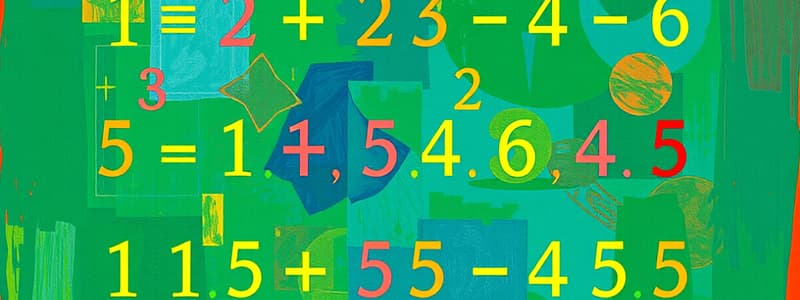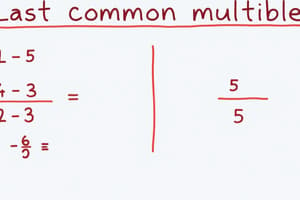Podcast
Questions and Answers
What is the Least Common Multiple (LCM) of 6 and 8?
What is the Least Common Multiple (LCM) of 6 and 8?
- 30
- 18
- 48
- 24 (correct)
Which method involves multiplying the greatest occurrences of prime factors to find the LCM?
Which method involves multiplying the greatest occurrences of prime factors to find the LCM?
- Division Method
- Prime Factorization (correct)
- Using the GCD
- Listing Multiples
For the numbers 18 and 30, what is their LCM when using the Division Method?
For the numbers 18 and 30, what is their LCM when using the Division Method?
- 45
- 120
- 90 (correct)
- 60
Which of the following statements about LCM is true?
Which of the following statements about LCM is true?
Using the GCD method, what is the LCM of 15 and 25?
Using the GCD method, what is the LCM of 15 and 25?
What is the first step in finding the LCM by Listing Multiples?
What is the first step in finding the LCM by Listing Multiples?
When is the LCM particularly useful according to its applications?
When is the LCM particularly useful according to its applications?
If the LCM of two numbers is 36, what can be inferred about their possible values?
If the LCM of two numbers is 36, what can be inferred about their possible values?
Flashcards are hidden until you start studying
Study Notes
Finding LCM
-
Definition of LCM:
- Least Common Multiple (LCM) of two or more integers is the smallest positive integer that is divisible by each of the numbers.
-
Methods to Find LCM:
-
Listing Multiples:
- Write the multiples of each number until a common multiple is found.
- Identify the smallest common multiple.
- Example: For 4 and 5:
- Multiples of 4: 4, 8, 12, 16, 20
- Multiples of 5: 5, 10, 15, 20
- LCM is 20.
-
Prime Factorization:
- Factor each number into its prime factors.
- Use each prime factor the greatest number of times it occurs in any of the factorizations.
- Multiply these together to get the LCM.
- Example: For 12 (2^2 × 3) and 15 (3 × 5):
- LCM = 2^2 × 3^1 × 5^1 = 60.
-
Using the GCD (Greatest Common Divisor):
- Formula: LCM(a, b) = (a × b) / GCD(a, b)
- Calculate the GCD using methods such as Euclidean algorithm.
- Substitute into the formula to find LCM.
- Example: For 8 (GCD is 4) and 12:
- LCM = (8 × 12) / 4 = 24.
-
Division Method:
- Write the numbers down and divide them by their common prime factors.
- Continue dividing until all remaining numbers are 1.
- Multiply all the divisors and the remaining numbers to get LCM.
- Example: For 18 and 24:
- 2 | 18, 24 → 9, 12
- 3 | 9, 12 → 3, 4
- 3 | 3, 4 → 1, 4
- LCM = 2 × 3 × 3 × 4 = 72.
-
-
Properties of LCM:
- LCM is always greater than or equal to the largest number.
- LCM is commutative: LCM(a, b) = LCM(b, a).
- LCM is associative: LCM(a, b, c) = LCM(LCM(a, b), c).
-
Applications of LCM:
- Useful in solving problems involving fractions with different denominators.
- Helpful in scheduling problems where events repeat at different intervals.
Finding LCM
- Least Common Multiple (LCM):
- The smallest positive integer divisible by each of a set of integers.
Methods to Find LCM
-
Listing Multiples:
- Identify multiples of each number until a common one appears.
- Example: For 4 and 5, the multiples are:
- 4: 4, 8, 12, 16, 20
- 5: 5, 10, 15, 20
- Therefore, LCM(4, 5) = 20.
-
Prime Factorization:
- Break numbers down into their prime factors.
- Combine each prime factor using the maximum occurrences from any factorization.
- Example: For 12 (2² × 3) and 15 (3 × 5):
- LCM = 2² × 3¹ × 5¹ = 60.
-
Using the GCD (Greatest Common Divisor):
- Use the formula: LCM(a, b) = (a × b) / GCD(a, b).
- Calculate GCD using methods such as the Euclidean algorithm.
- Example: For 8 with GCD of 4 and 12:
- LCM = (8 × 12) / 4 = 24.
-
Division Method:
- Write numbers and divide by common prime factors repeatedly.
- Continue until all remaining values are 1.
- Multiply all divisors and remaining numbers for LCM.
- Example: For 18 and 24:
- 2 | 18, 24 → 9, 12
- 3 | 9, 12 → 3, 4
- 3 | 3, 4 → 1, 4
- LCM = 2 × 3 × 3 × 4 = 72.
Properties of LCM
- LCM is always greater than or equal to the largest integer in the set.
- Commutative property: LCM(a, b) = LCM(b, a).
- Associative property: LCM(a, b, c) = LCM(LCM(a, b), c).
Applications of LCM
- Essential for solving problems with fractions that have different denominators.
- Important for scheduling events that recur at varying intervals.
Studying That Suits You
Use AI to generate personalized quizzes and flashcards to suit your learning preferences.




